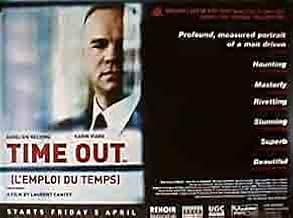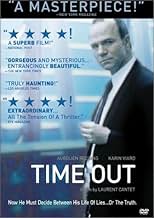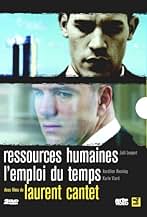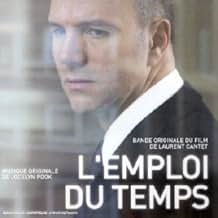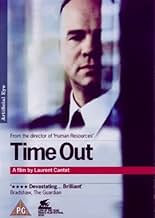CALIFICACIÓN DE IMDb
7.3/10
5.1 k
TU CALIFICACIÓN
Agrega una trama en tu idiomaAn unemployed man finds his life sinking more and more into trouble as he hides his situation from his family and friends.An unemployed man finds his life sinking more and more into trouble as he hides his situation from his family and friends.An unemployed man finds his life sinking more and more into trouble as he hides his situation from his family and friends.
- Premios
- 3 premios ganados y 8 nominaciones en total
- Dirección
- Guionistas
- Todo el elenco y el equipo
- Producción, taquilla y más en IMDbPro
Argumento
¿Sabías que…?
- TriviaInspired by a true story, that of Jean-Claude Romand. In reality, Romand went on to kill, on January 9, 1993, his wife, two children and both his parents. It is the first of three films in two years inspired by the case, followed by L'adversaire (2002) and La vida de nadie (2002), of which the former is the closest to the real events. Phantom (2002) was also inspired by the same incident.
- ConexionesFeatured in The 2003 IFP Independent Spirit Awards (2003)
- Bandas sonorasL'Emploi Du Temps - Musique Originale
Composed by/ Arranged By Jocelyn Pook
Performed by 'Electra Strings' Ensemble
Cello Solo performed by Sophie Harris
Viola Solo performed by Clive Howard
Violin solo performed by Jacqueline Norrie
Phonographic Copyright (p) Jocelyn Pook / Haut et Court
Under Exclusive License To Virgin France
Published By Chester Music Ltd.
© 2001 Virgin France
Opinión destacada
"Time Out" seems to be the wrong translation for "L'emploi du temps". Laurent Cantet, the brilliant French director has given us a film that has a hypnotic quality and makes the viewer thinks. M. Cantet also wrote the material for the movie with Robin Campillo. This is, without a doubt, one of the most satisfying films coming from France in recent memory. As he proved with his "Human Resources", M. Cantet loves to present us stories in which characters are at the crossroads of their lives facing dilemmas related to things in the work environment.
If you haven't watched the film, perhaps you should like to stop reading now.
Vincent, the main character of "Time Out", is seen at the beginning of the film driving aimlessly through rural France, stopping at rest stops to sleep, buying things at roadside shops, or just idling around. When he calls his wife Muriel in his cell phone, we hear banal conversation between a married couple where the husband is calling home to check on his family. The only trouble is that Vincent is unemployed and he is reluctant to break the news to the family.
This man has a lovely wife, three normal children. His parents seem to have a good relationship with him. We see no sight of conflict. That is why so hard to understand what makes Vincent tick. Is it shame? Is it an ego thing? Is it his pride? Nothing seems to answer our questions because for all appearances, he is a normal person.
When Vincent hints about the possibility of a job in Geneva with the UN, his father, as well as the rest of the family believes him. Vincent witnesses a meeting in the UN building about the investment opportunities in Africa and how is that body going to be instrumental in helping the emerging economies. Suddenly, Vincent makes a plan to get some of his friends part with their savings by inventing a sure plan with incredible returns. In a way, it seems that people will be reluctant of schemes such as this one, but obviously, greed play a great deal in their minds and they give money to any charlatan. I know it first hand since I have a close friend that lost a lot of money this way, even though he understood about the risks involved.
Jean Michel, the mysterious man that happens to overhear Vincent pitching the idea to prospective investors, realizes the impossibility of the scheme. Vincent tells him about his plight and Jean Michel offers him a job helping him smuggle the counterfeit merchandise that makes a lot of money.
Unfortunately for liars, discovery is only a phone call away. Muriel finds out the truth and confronts Vincent about it. She tells her father in law, who has given an obscene amount of money to Vincent. When the father arrives at the house, Vincent flees into the night to the comforting highways that have become his best friends because they don't ask anything of him. Eventually, Vincent is seen calling Muriel from a roadside. She pleads with him to come home, but he refuses. The turmoil within his soul will not let him see the end of the tunnel. In his own mind, there is no solution for the problem he created.
The director hints to an easy solution for Vincent with an imminent suicide, but no. In the last sequence that ends the picture, we watch a Vincent dressed all in black being interviewed for a job that his father has been instrumental in securing for him. Are we seeing the truth, or are we seeing what the director has brilliantly done in order to get take us to a possibility that will register as the solution in our minds. The only thing is M. Cantet has left us clues about what really becomes of Vincent.
Aurelien Recoing, is a terrific actor. As times he reminds us of Kevin Spacey, and at times, he resembles a more ethereal James Gandolfini, but make no mistake, M. Recoing is an actor who captured the essence of the troubled Vincent. As Muriel, Karin Viard, is perfect. She gives a restrained performance. Also, Serge Livrozet, the kind Jean Michel, makes a wonderful appearance.
We await for the next work by the amazing Laurent Cantet.
If you haven't watched the film, perhaps you should like to stop reading now.
Vincent, the main character of "Time Out", is seen at the beginning of the film driving aimlessly through rural France, stopping at rest stops to sleep, buying things at roadside shops, or just idling around. When he calls his wife Muriel in his cell phone, we hear banal conversation between a married couple where the husband is calling home to check on his family. The only trouble is that Vincent is unemployed and he is reluctant to break the news to the family.
This man has a lovely wife, three normal children. His parents seem to have a good relationship with him. We see no sight of conflict. That is why so hard to understand what makes Vincent tick. Is it shame? Is it an ego thing? Is it his pride? Nothing seems to answer our questions because for all appearances, he is a normal person.
When Vincent hints about the possibility of a job in Geneva with the UN, his father, as well as the rest of the family believes him. Vincent witnesses a meeting in the UN building about the investment opportunities in Africa and how is that body going to be instrumental in helping the emerging economies. Suddenly, Vincent makes a plan to get some of his friends part with their savings by inventing a sure plan with incredible returns. In a way, it seems that people will be reluctant of schemes such as this one, but obviously, greed play a great deal in their minds and they give money to any charlatan. I know it first hand since I have a close friend that lost a lot of money this way, even though he understood about the risks involved.
Jean Michel, the mysterious man that happens to overhear Vincent pitching the idea to prospective investors, realizes the impossibility of the scheme. Vincent tells him about his plight and Jean Michel offers him a job helping him smuggle the counterfeit merchandise that makes a lot of money.
Unfortunately for liars, discovery is only a phone call away. Muriel finds out the truth and confronts Vincent about it. She tells her father in law, who has given an obscene amount of money to Vincent. When the father arrives at the house, Vincent flees into the night to the comforting highways that have become his best friends because they don't ask anything of him. Eventually, Vincent is seen calling Muriel from a roadside. She pleads with him to come home, but he refuses. The turmoil within his soul will not let him see the end of the tunnel. In his own mind, there is no solution for the problem he created.
The director hints to an easy solution for Vincent with an imminent suicide, but no. In the last sequence that ends the picture, we watch a Vincent dressed all in black being interviewed for a job that his father has been instrumental in securing for him. Are we seeing the truth, or are we seeing what the director has brilliantly done in order to get take us to a possibility that will register as the solution in our minds. The only thing is M. Cantet has left us clues about what really becomes of Vincent.
Aurelien Recoing, is a terrific actor. As times he reminds us of Kevin Spacey, and at times, he resembles a more ethereal James Gandolfini, but make no mistake, M. Recoing is an actor who captured the essence of the troubled Vincent. As Muriel, Karin Viard, is perfect. She gives a restrained performance. Also, Serge Livrozet, the kind Jean Michel, makes a wonderful appearance.
We await for the next work by the amazing Laurent Cantet.
- jotix100
- 27 feb 2005
- Enlace permanente
Selecciones populares
Inicia sesión para calificar y agrega a la lista de videos para obtener recomendaciones personalizadas
- How long is Time Out?Con tecnología de Alexa
Detalles
Taquilla
- Total en EE. UU. y Canadá
- USD 448,542
- Total a nivel mundial
- USD 1,213,913
- Tiempo de ejecución2 horas 14 minutos
- Color
- Mezcla de sonido
- Relación de aspecto
- 1.85 : 1
Contribuir a esta página
Sugiere una edición o agrega el contenido que falta

Principales brechas de datos
By what name was Tiempo De Mentir (2001) officially released in India in English?
Responda



